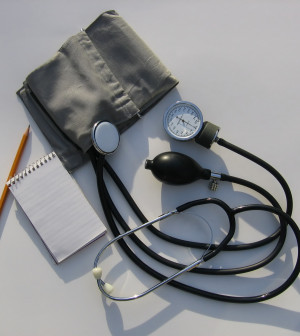- 8 Ways to Increase Dopamine Naturally
- 7 Best Breads for Maintaining Stable Blood Sugar
- Gelatin vs. Collagen: Which is Best for Skin, Nails, and Joints?
- The Long-Term Effects of Daily Turmeric Supplements on Liver Health
- Could Your Grocery Store Meat Be Causing Recurring UTIs?
- Are You Making This Expensive Thermostat Error This Winter?
- Recognizing the Signs of Hypothyroidism
- 10 Strategies to Overcome Insomnia
- Could Artificial Sweeteners Be Aging the Brain Faster?
- Techniques for Soothing Your Nervous System
Anxiety Tied to Stroke Risk in Study


Could anxiety boost the risk for stroke? A new long-term study suggests just that — the greater the anxiety, the greater the risk for stroke.
Study participants who suffered the most anxiety had a 33 percent higher risk for stroke compared to those with the lowest anxiety levels, the researchers found.
This is thought to be one of the first studies to show an association between anxiety and stroke. But not everyone is convinced the connection is real.
“I am a little skeptical about the results,” said Dr. Aviva Lubin, associate stroke director at Lenox Hill Hospital in New York City, who had no part in the study.
The researchers pointed out that anxiety can be related to smoking and increased pulse and blood pressure, which are known risk factors for stroke. However, Lubin still has her doubts.
“It still seems a little hard to fully buy into the fact that anxiety itself is a major risk factor that we need to deal with,” she said.
Lubin said that treating risk factors like smoking, high blood pressure and diabetes are the keys to preventing stroke. “I doubt that treating anxiety itself is going to decrease the risk of stroke,” she said.
The report was published Dec. 19 in the online edition of the journal Stroke.
The study was led by Maya Lambiase, a cardiovascular behavioral medicine researcher in the department of psychiatry at the University of Pittsburgh School of Medicine. Her team collected data on more than 6,000 people aged 25 to 74 when they enrolled in the first U.S. National Health and Nutrition Examination Survey, started in the early 1970s.
These people were interviewed and had medical tests and completed questionnaires to assess their levels of anxiety and depression.
Over the following 22 years, the researchers used hospital or nursing home records and death certificates to keep track of strokes among the participants.
The investigators found that even after taking into account other factors, even modest increases in anxiety were associated with greater odds of having a stroke.
“Everyone has some anxiety now and then. But when it’s elevated and/or chronic, it may have an effect on your vasculature [blood vessel system] years down the road,” Lambiase said in an American Heart Association news release.
It’s not clear whether anxiety itself increases the risk of stroke, or if the rise is due to the behaviors these people exhibit. For example, people with high anxiety levels are more likely to smoke and be physically inactive, the researchers noted.
In addition, higher stress hormone levels, heart rate or blood pressure could also be factors, Lambiase pointed out.
Although the study found an association between higher anxiety levels and increased risk of stroke, it did not prove a cause-and-effect relationship.
Commenting on the study, Dr. Scott Krakower, the assistant unit chief of psychiatry at Zucker Hillside Hospital in Glen Oaks, N.Y., said, “We know that a little bit of anxiety is a good thing, but when anxiety becomes excessive, it takes a toll on the body and needs to be treated.”
As far as the risk of stroke is concerned, Krakower thinks more studies are needed to confirm the association or discredit it.
He noted that there have been studies that link stroke with depression, but the effects of anxiety haven’t been studied in depth.
Anxiety is one of the most common mental health problems people face, and a lot more people have anxiety than depression, Krakower said. “And it’s often overlooked,” he noted.
Treating anxiety might not lower the risk for stroke, “but it will improve your quality of life,” he added.
More information
To learn more about stroke, visit the U.S. National Library of Medicine.
Source: HealthDay
Copyright © 2026 HealthDay. All rights reserved.










